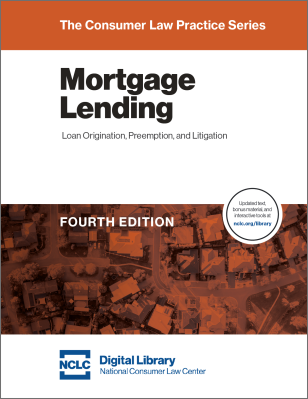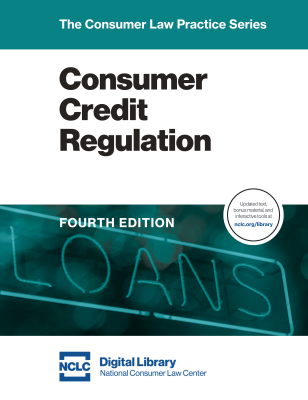The Supreme Court’s May 30 decision in Cantero v. Bank of America, 144 S. Ct. 1290 (2024), limits federal preemption of state laws affecting national banks. Not only does this increase national bank exposure to state laws, but the decision has significance for state law application to federal savings associations, federal credit unions, and even to state banks and credit unions.
The direct impact on national banks alone is enough to make the decision highly relevant to consumer practitioners. The six biggest U.S. banks are all national banks and make up over 55% of the entire banking system’s assets. They, along with the over 1000 other national banks in the country, have an enormous effect on consumers and the overall economy, so the laws governing them are of great importance.
This article explains federal banking preemption in one paragraph, and then explains the Supreme Court’s May 30 Cantero decision, its key takeaways, and its practice implications, and then lists state laws that are unlikely now to be preempted. Finally, the article lists transactions where federal banking preemption never applies.
Federal Banking Preemption in One Paragraph
One form of federal preemption—rate exportation—allows banks to ignore the laws of states outside their home state governing interest rates and credit-related fees. However, this right to “export” their home state laws does not affect the applicability of the consumer’s home state laws in areas other than interest rates and credit-related fees. The main form of preemption of state non-interest rate regulation is based on the National Bank Act (NBA) (and, for federal savings associations, the Home Owners Loan Act or HOLA) and Office of Comptroller of the Currency (OCC) regulations. In 2010, reacting to courts’ and federal banking regulators’ over-expansive interpretations of the preemptive effect of federal law in the years leading up to the Great Recession, the Dodd-Frank Act Wall Street Reform and Consumer Protection Act limited NBA/HOLA preemption to the standard announced in Barnett Bank of Marion County v. Nelson, 517 U.S. 25, 33 (1996). If a state law does not discriminate against national banks, Barnett Bank allows the NBA to preempt the state law “only if” the law would “prevent, or significantly interfere with, a national bank’s exercise of its powers.” Nevertheless, 14 years later, the OCC’s regulations, and decisions from a number of courts, still take overly broad approaches that are inconsistent with Barnett Bank.
The Supreme Court’s Cantero Decision
The Supreme Court’s May 30 decision in Cantero v. Bank of America hammers home the centrality of the limited preemption allowed by the “Barnett Bank” standard for assessing whether federal banking laws preempt the application of state laws to national banks and federal savings associations.
Cantero addresses a Second Circuit decision that held that the NBA preempts a New York law requiring banks to pay interest on escrow accounts. Ignoring the Barnett Bank standard, the Second Circuit held that the issue was not the degree of the state law’s effects on banks but whether the state law would, if enforced, exert control over a banking power. The Second Circuit thereby read “significantly” out of both Barnett Bank and the Dodd-Frank Act, reverting to prior interpretations that Congress rejected in 2010.
In a unanimous opinion, the Supreme Court rejected the Second Circuit’s view that “federal law preempts any state law that ‘purports to exercise control over a federally granted banking power,’ regardless of ‘the magnitude of its effects.’” Instead, the Dodd-Frank Act’s incorporation of the Barnett Bank standard means that the NBA preempts a nondiscriminatory state law “only if” the law “prevents or significantly interferes” with a bank’s exercise of its power. The Court explained that the Barnett Bank standard does not create a bright line: it requires “a practical assessment of the nature and degree of interference caused by a state law.” Cantero, at 1300. Courts should use a “nuanced comparative analysis.” Cantero, at 1301. To make this analysis, courts must compare the state law in question with state laws that Supreme Court decisions have held to be preempted or not preempted, as the Court did in Barnett Bank.
Key Takeaways from Cantero
Key takeaways from Cantero are:
- Prevent or significantly interfere. The Barnett Bank standard requires a determination that a state law “prevents or significantly interferes” with a bank’s exercise of its powers; it does not allow for bright line, categorical preemption of state laws regardless of the magnitude of their effects. This standard applies even to state laws that, like the interest-on-escrow law at issue in Cantero, are specifically directed at banks.
- Practical assessment. The evaluation of whether a state law is preempted requires a “practical assessment of the nature and degree of interference the state law causes.” This determination must be made by comparing the state law in question with those the Supreme Court has held to be preempted or not preempted.
The opinion stresses several additional important points:
- “Dodd-Frank ruled out field preemption … . As a result, we know that not all state laws regulating national banks are preempted.” Cantero, at 1297. See also NCLC’s Mortgage Lending § 6.2.3. Moreover, even if not called “field preemption,” the Court rejected “a categorical test that would preempt virtually all state laws that regulate national banks, at least other than generally applicable state laws such as contract or property laws.” Cantero, at 1301.
- Generally applicable state laws, such as contract, property, and debt collection laws, are normally not preempted. See NCLC’s Mortgage Lending §§ 6.2.2.2a, 6.5.4.
- The Dodd-Frank Act did not change the substantive standard for NBA preemption: Barnett Bank, as interpreted by Cantero, governed both before and after the Act.
Major Practice Implications of Cantero
—Analysis of Supreme Court’s preemption decisions must be a part of every preemption case
Most courts that have addressed NBA preemption have not performed the analysis that Cantero mandates. Many have simply applied the OCC’s broad preemption regulations. After Cantero, consumer practitioners should insist on a Barnett Bank analysis even where an OCC regulation appears to create a blanket exemption for a type of state law. That analysis must evaluate whether the state law in fact prevents or significantly interferes with the bank’s exercise of its powers and must compare the state law in question with the state laws addressed by Supreme Court preemption decisions. Those decisions are summarized in NCLC’s Mortgage Lending § 6.2.2.2 (including for areas outside of mortgage lending).
—The validity of the OCC’s preemption regulations is doubtful
The revised regulations that OCC adopted after the Dodd-Frank Act was passed were of questionable legality even before the Cantero decision. See NCLC’s Mortgage Lending § 6.4.3. Cantero makes it even more likely that those regulations are invalid: contrary to Cantero, the regulations purport to draw bright lines broadly preempting categories of state laws, and they were adopted without comparing the state laws in question with Supreme Court decisions, without finding significant interference, and without following certain procedures that the Dodd-Frank Act mandates.
—The former OTS field preemption regulations may have no further effect
Prior to Dodd-Frank, federal savings associations (also known as federal savings and loan associations) were regulated by the Office of Thrift Supervision (OTS), and the OTS had claimed that its regulation occupied the field and preempted whole categories of state laws. Those OTS rules have continued a zombie half-life in that courts have continued to apply them to claims against federal savings associations under contracts that were originated when the regulations were in effect.
Cantero’s disapproval of bright-line tests for preemption, and its insistence on a practical analysis of the effect of state laws, apply just as much to federal savings associations as to national banks. See NCLC’s Mortgage Lending § 6.11.3. Since Cantero makes it clear that the Barnett Bank standard applied both before and after the Dodd-Frank Act, there is a strong argument that OTS’s regulations were invalid when adopted and should no longer be given any weight.
—Corresponding limits on indirect federal preemption applicable to state banks
Federal law allows certain branches of out-of-state banks to avoid the state law of the consumer’s state if a national bank can avoid that state law. See NCLC’s Mortgage Lending § 6.8. Certain state parity statutes also allow an in-state bank to avoid state law if a national bank can avoid state law. NCLC’s Consumer Credit Regulation § 3.7. Since Cantero limits federal preemption of state law as to national banks, it has the indirect effect of limiting the ability of these state banks to avoid state law, since that ability depends on a national bank being able to avoid the state law.
State Laws That Are Unlikely to Be Preempted
Cantero stresses that national banks remain subject to state laws governing their daily course of business, such as generally applicable state contract, property, and debt collection laws, and this principle is also written in to OCC’s preemption regulations. As a result, many types of state laws are unlikely to be held preempted under the Barnett Bank standard as interpreted by Cantero. Some examples:
State debt collection laws. A number of courts have held that this principle preserves state laws prohibiting unfair and deceptive debt collection practices or limiting repossession or requiring special procedures for repossession. See NCLC’s Fair Debt Collection § 16.1.2; NCLC’s Repossessions § 2.5.
State foreclosure laws. State foreclosure laws are a type of property law and a type of debt collection law, and so they fall into two of the categories of state law that Cantero highlights as not preempted. Yet a number of courts have found preemption as to state laws that protect against hasty or wrongful foreclosure, such as by giving the homeowner an opportunity to cure the default. See NCLC’s Mortgage Servicing and Loan Modifications § 11.12.5. This position is inconsistent with Cantero. Even if state foreclosure laws were specifically directed at banks, rather than being generally applicable to any foreclosing creditor, Cantero makes it clear that they could not be preempted without a showing that the law prevents or significantly interferes with a bank’s exercise of its powers.
State contract laws. State contract laws are another type of generally applicable state law, and most courts have held that federal banking law does not preempt them. This includes not just the Uniform Commercial Code, but also provisions of state law that go beyond or differ from the UCC. See Aguayo v U.S. Bank, 653 F.3d 912 (9th Cir. 2011); NCLC’s Repossessions § 2.5.3.1. Some courts have held that the UCC’s prohibition of unconscionable contract terms and its imposition of a duty of good faith and fair dealing are preempted when used to challenge a bank’s substantive acts or contract terms, but these laws are clearly generally applicable, and Cantero gives new strength to the argument that these laws are not preempted.
State tort law. State tort law is also generally applicable, and the OCC’s regulation lists tort law as a type of law that is not preempted. Torts that may apply to banks’ dealings with consumers include common law fraud, conversion (in the case of seizure of a consumer’s bank account or other property), and negligence. See NCLC’s Automobile Fraud Chapter 8, NCLC’s Fair Debt Collection Chapter 15.
State laws that parallel federal laws or regulations. A state law that parallels a federal statute or regulation cannot be said to prevent or significantly interfere with a bank’s exercise of its powers, since it merely prevents a bank from doing what federal law already prevents. A parallel federal statute or regulation is often surprisingly easy to find. For example, the FTC Act, the Dodd-Frank Act, and OCC regulations all prohibit national banks from engaging in unfair or deceptive acts or practices (UDAPs). A state law such as a UDAP statute that prohibits the same thing does not interfere with a bank’s powers, as the bank has no power to disobey federal statutes and regulations, so the law should not be considered preempted. See NCLC’s Mortgage Lending § 6.2.2.3.
Any law if there is no showing that it prevents or significantly interferes with the bank’s exercise of its powers. As noted above, Cantero holds that there is not a bright line test for preemption of state laws as applied to banks. As a result, any state law—even one that directly regulates national banks, as long as it does not discriminate against national banks—is not preempted by the NBA unless there is a showing that the law prevents or significantly interferes with the bank’s exercise of its powers.
Where Barnett Bank Preemption NEVER Applies
- State regulation of interest rates: Barnett Bank preemption does not apply to state regulation of interest, and only preempts state credit regulation other than laws governing interest. Different provisions of the NBA and other federal banking laws give banks the right to export their home state interest laws, but there are exceptions. See NCLC’s Consumer Credit Regulation § 3.5; NCLC’s Mortgage Lending § 9.4. That a bank can avoid a consumer’s home state usury limits does not mean the bank can avoid other consumer credit regulation of the consumer’s home state.
- Loans assigned to banks: Barnett Bank preemption generally only applies when a national bank or federal savings association originates credit, not when these banks are assigned a loan originated by an entity that cannot claim Barnett Bank preemption. See NCLC’s Mortgage Lending § 6.9.1.
- Nonbanks: Barnett Bank preemption never applies to credit originated by entities other than banks and other depositories. Credit originated by payday lenders, car dealers, installment lenders, title pawn lenders, and the like can never claim Barnett Bank preemption. Less clear is whether a nonbank can take advantage of Barnett Bank preemption when a national bank or federal savings association originates credit and assigns an account to the nonbank. See NCLC’s Mortgage Lending § 6.9.2. Here again, different rules apply to laws governing interest on loans assigned by a bank to a nonbank. See NCLC’s Consumer Credit Regulation § 3.5.3.
- State banks chartered in the consumer’s state: Barnett Bank preemption does not apply to state banks making loans in the state where the bank is chartered. Nevertheless, the operation of a state’s “parity” statute may give a state bank making loans in its own state the same rights as a national bank making loans in that state. See NCLC’s Consumer Credit Regulation § 3.7. If a national bank need not comply with a state law and only with any applicable OCC requirements, then a state’s parity statute may allow an in-state, state bank also to ignore the state requirement and instead comply with any OCC requirement.
- Certain out-of-state, state banks: Barnett Bank preemption does not apply to an out-of-state, state bank making loans in another state unless it has a branch in that state and the loan is made from that branch, not from the bank’s headquarters. Even then, Barnett Bank preemption only affects which state’s law applies, and does not preempt all state law. Where Barnett Bank preempts a specific state law’s application to a national bank, then the branch of the out-of-state, state bank need not comply with that specific state law found in the consumer’s state, but instead complies with the relevant law of the bank’s home state. See NCLC’s Mortgage Lending § 6.8.
- State credit unions: Barnett Bank preemption never applies to state credit unions, whose powers come from state, not federal law. Unlike state banks, state credit unions do not have a federal law allowing them to piggyback on their federal counterparts. However, it is possible that National Credit Union Administration (NCUA) regulations could preempt a state law that impacts the safety and soundness of state credit unions (and thus threaten the federal deposit insurance fund). In addition, a state parity law may give in-state, state credit unions the same rights as federal credit unions. NCLC’s Consumer Credit Regulation § 3.7.
National bank and federal credit union subsidiaries, affiliates or agents: Barnett Bank preemption does not extend to subsidiaries, affiliates, or agents of national banks or federal savings associations. See NCLC’s Mortgage Lending § 6.7. Subsidiaries or affiliates of federal credit unions (credit union service organizations) also do not enjoy any Barnett Bank preemption. NCLC’s Mortgage Lending § 6.12.5.



